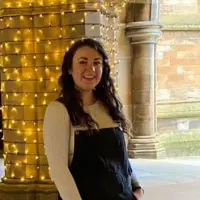Diagnosed at 27, Megan shares her coeliac story

Real Stories
Irina's Story
Diagnosed in 2017 Irina shares her coeliac story
When did you get diagnosed with coeliac disease?
I got my coeliac diagnosis 5 years ago in 2017.
How did you feel about the diagnosis?
This might sound strange but I was relieved and excited. I had been trying to figure out what was ‘off’ with my body for the previous 2 years. My symptoms however were completely atypical - I had urticaria all over my body, on and off, and at times it was debilitating. After lots of tests and no resolutions, through my research I found that there is a link between urticaria and coeliac. My GP was not at all convinced but agreed to carry out the tests. So I was excited to have finally found an answer, and relieved that I now knew what I needed to do to make my body feel better.
What was your relationship with food like before you were diagnosed with coeliac disease?
I had always had a great relationship with food - I always loved and ate a bit of everything and never really had any digestive issues. Growing up in Romania we did eat a lot of gluten based foods (we eat bread with everything), but I never suspected anything as my body was not showing any of the typical signs.
Have you ever felt like you have missed out because of coeliac disease?
Not at all. I am lucky to be living in London where most places have at least one gluten free option so I never have to miss out on social activities. But I think the main reason I don’t feel like I’m missing out is the mindset - I don’t see gluten foods as something that’s delicious but ‘forbidden’ for me. I just see them as something that’s not good for my body, so I genuinely don’t crave them. So I never get jealous if I see someone eating a croissant for example, haha! And the quest for gluten free goodies just becomes an exciting part of any trip - we discovered two amazing gluten free patisseries in my boyfriend’s hometown in Italy, and we love stopping by for an arancini or a cream tart!
Did you notice a difference in mood and health after sticking to your gluten-free diet?
While I said I didn’t have any digestive symptoms pre diagnosis, after I stopped eating gluten I did notice that I had perhaps always been a little bit bloated and just had no idea. I do think I felt I had more energy after sticking to a gluten free diet, though the change was not drastic.
What does eating "well" mean to you?
First of all it means listening to my body and letting it guide me. Growing up I wasn’t taught this, and instead I was always encouraged to overeat (Eastern European grandparents anyone?). I have learnt that my meal sizes are smaller than the average person’s, and that’s what I need to feel good. I also know I need a good mix of nutrients so I keep a varied diet. When I don’t, and I get stuck in a loop of eating ‘stuff on toast’ because I’m too busy or tired to cook for example, my body feels the difference.
What advice would you give to your younger self or to a newly diagnosed coeliac about what you now know about coeliac disease and gluten-free foods?
You need to become confident being your own strongest advocate. Don’t feel pressured to give in to suggestions to ‘just try a little bit’ of a muffin, don’t eat something if you’re unsure of whether it has traces just because a good friend made it. Don’t worry about making others uncomfortable, rally support around you, tell your family and friends that eating GF is something you need a bit of help with, and don’t feel like you have to do it alone! This is more likely to make them act proactively rather than be annoyed by your restrictions.
And finally, what's your top tip for staying positive?
While I think it is easy to keep a GF diet by focusing on the things you can have rather than those you can’t, there is still a mental load element to it. You have to check labels, you have to be mindful of your symptoms and do yearly check ups, you have to plan meals in advance, remember to carry emergency snacks and you have to do extra research when travelling. You also need to constantly communicate your needs to others around you and this can be exhausting. So go easy on yourself if you ever feel overwhelmed! If you’re not feeling particularly positive about it, then allow yourself to feel sad, ask a friend for emotional support and remind yourself that yes, having coeliac is sometimes difficult. And you can do difficult things.
Keep up with Irena's journey here

